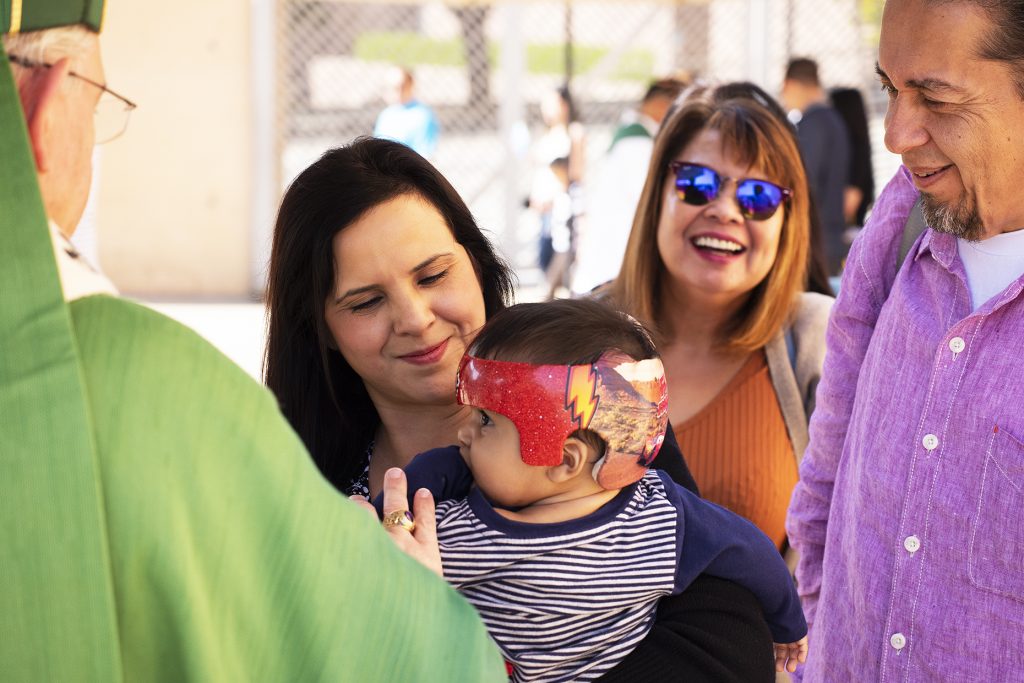There are times when we can wonder about the state of our humanity.
The news of the day is filled with reports of violence and cruelty. In our political and media culture, people are often angry and rude, especially with those they disagree with. In daily life, it seems sometimes that our technology makes it easier for us to be indifferent to those around us.
When we think about these things, we can be tempted to wonder if something in us is changing, if, as a people, we are becoming cruder, more uncaring.
I don’t think so. Decency may be in decline, but it is not dead. Two recent events make me hopeful.
The first is the story of the young Dallas man, Brandt Jean. In an open courtroom, he embraced Amber Guyger, the woman who killed his brother, and said he forgave her.
It was a moment of grace and a beautiful Christian witness to the power of mercy and love. Even in his suffering and grief, this young man was seeking to bring this woman to Jesus, by his words and by his example.
He said to her: “I forgive you. I know if you go to God and ask him, he will forgive you. … I don’t even want you to go to jail. … I want the best for you … and the best would be to give your life to Christ. … Again, I love you as a person.”
The second story is closer to home, taking place in the subway station not far from our archdiocesan offices here in Koreatown.
Emily Zamourka is a refugee who came to America from Moldova when the Soviet Union fell in 1992. A singer and musician, she gave music lessons here in Los Angeles until her violin was stolen and her health began to fail several years ago.
She fell behind on her bills and, like so many in our city, she ended up homeless, living on the streets, singing for money in the subway.
She was on the subway platform, singing an opera aria, when a Los Angeles Police Department officer was moved by her voice and asked permission to record her.
The video he posted on the LAPD Twitter account went viral, and has been watched more than 1 million times.
4 million people call LA home. 4 million stories. 4 million voices...sometimes you just have to stop and listen to one, to hear something beautiful. pic.twitter.com/VzlmA0c6jX
— LAPD HQ (@LAPDHQ) September 27, 2019
Now this 52-year-old woman’s life has been changed by the kindness of strangers.
Individuals touched by the video, set up GoFundMe campaigns, and nearly 2,000 people have pledged money to help Zamourka find a place to live and buy a new violin. A Los Angeles City Council member arranged for her to find shelter and play her first concert. After the concert, she was offered a recording contract.
It is a beautiful story of compassion and kindness — and also faith. Zamourka told a reporter that in all her years on the streets, she never lost her sense that God was with her.
“It has to end at some point, somehow, someday,” she would tell herself. “If it’s God’s will for my life to change, then I will praise him and be so grateful.”
We need to lift up stories like this that celebrate our human capacity for goodness, for kindness and empathy.
From the stories we tell, we learn how to live. I worry that the stories we tell in our culture — in our news, movies, social media — present a picture that is distorted.
We are not what we appear to be on our “screens.” Human beings are not all appetites and desires, ruthless competitors pursuing their own self-interests, everyone out for themselves.
There is no denying that people can do ugly things. But people are doing beautiful things all the time — we just need to know where to look and train ourselves to see.
Everyday kindness is real. Hidden from view, little works of redemption, little acts of tender mercy, are happening all the time. Most of us are trying to live the Golden Rule, showing to others the compassion and love that we want for ourselves.
We need to remember this, and we need to tell these stories, to lift up our world, to help our neighbors find hope and love.
What makes us human? It is the question for our times. But there is a question that comes before that. Who makes us human? That question makes all the difference.
We are made from out of God’s love and we are made to live in his love. And, we have available to us in every moment the gifts of God’s grace to live as we know we ought to live.
Pray for me this week and know that I am praying for you.
And let us ask our Blessed Mother Mary to help us to continue to live what we believe and to become the people we are made to be.

